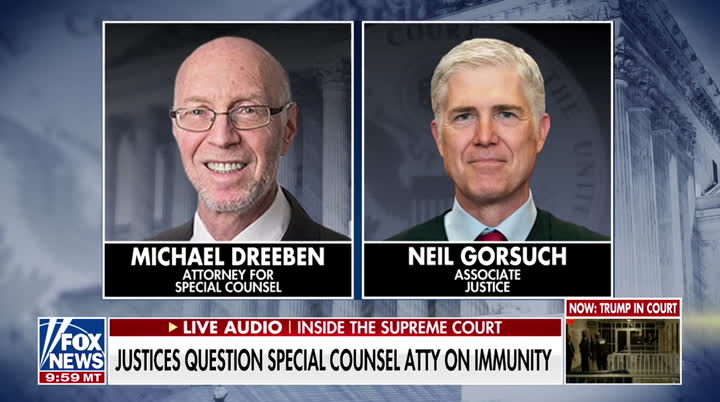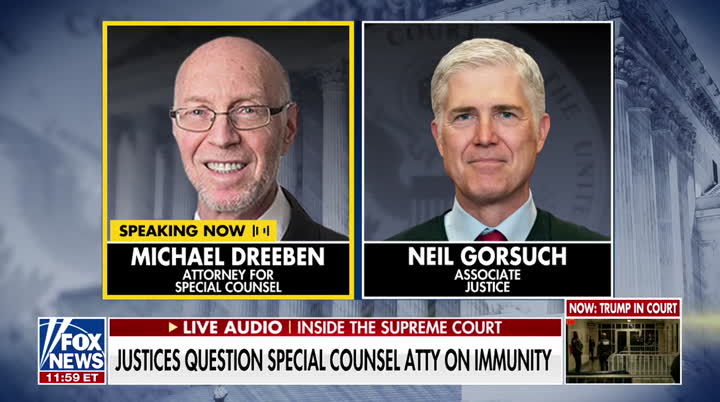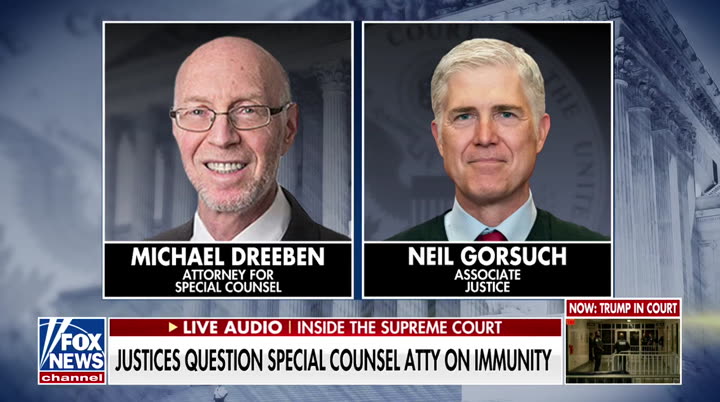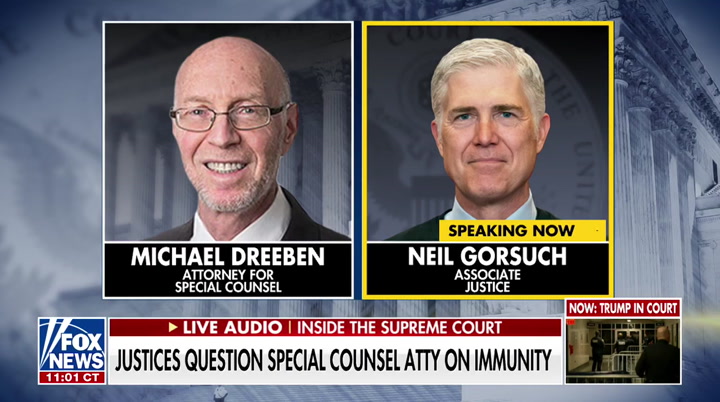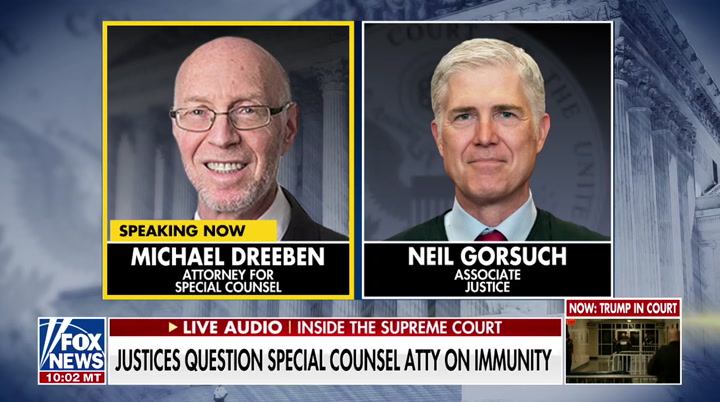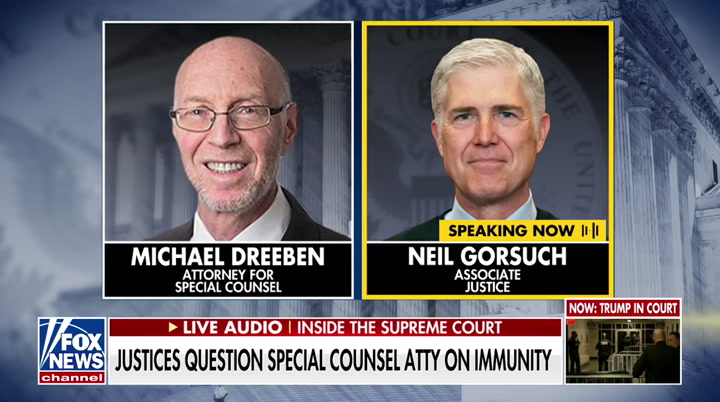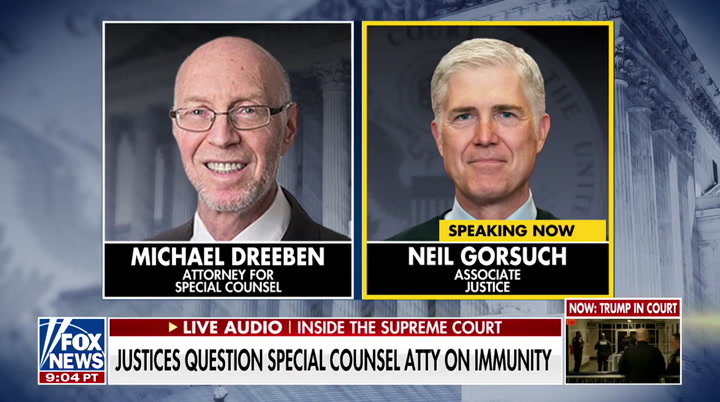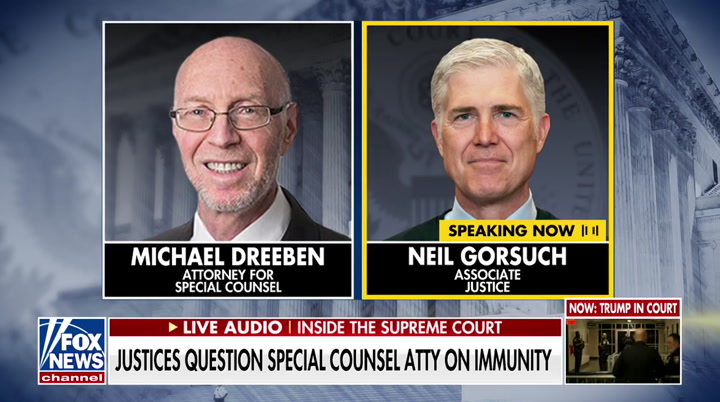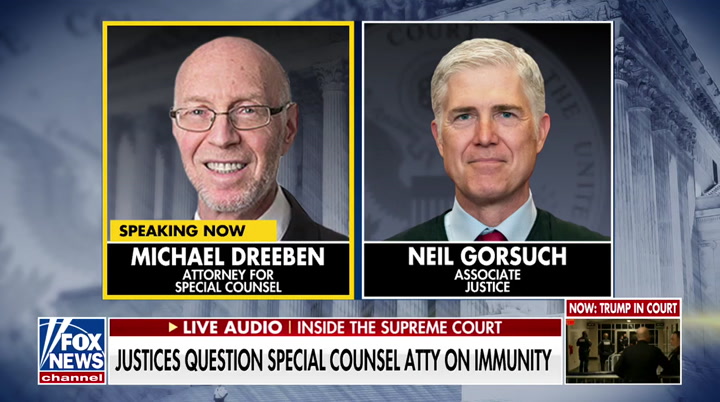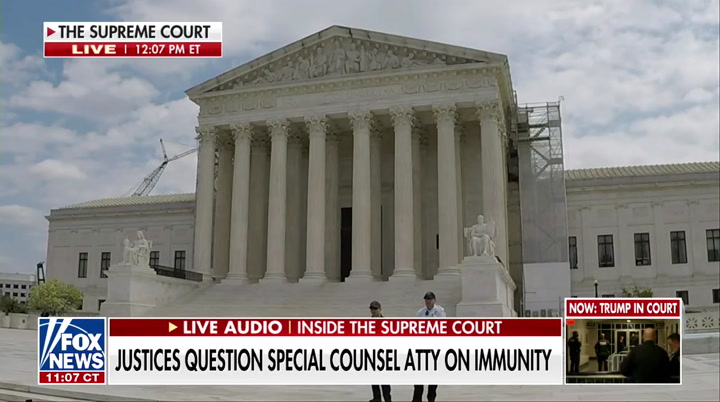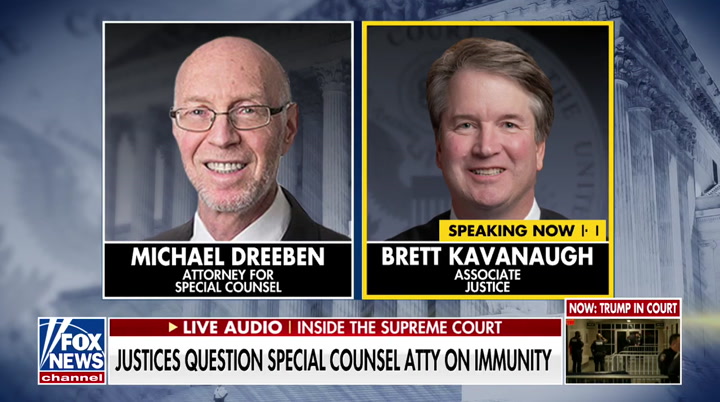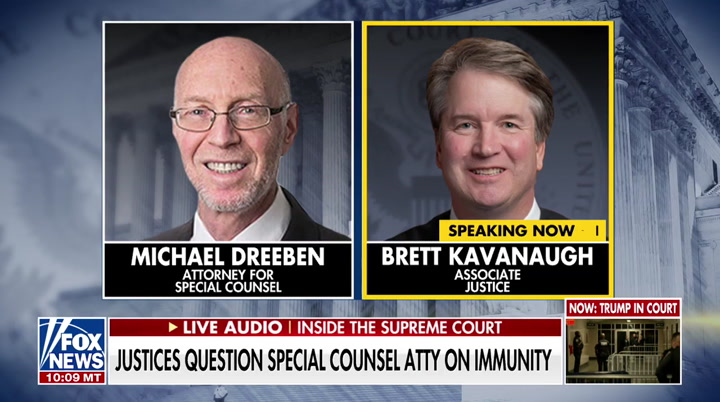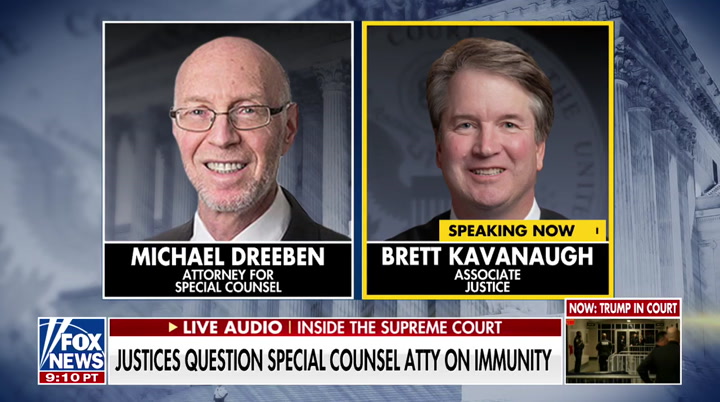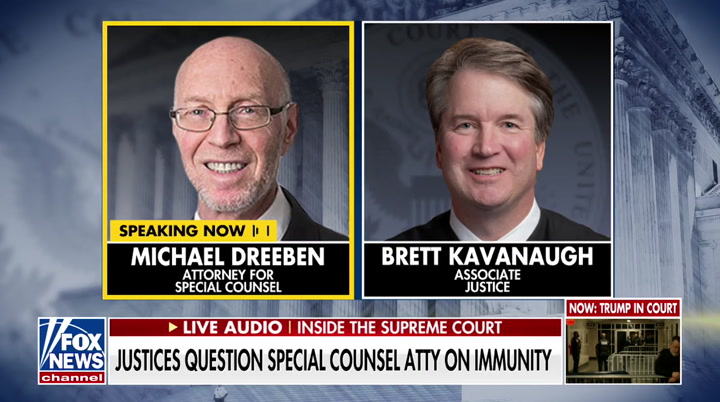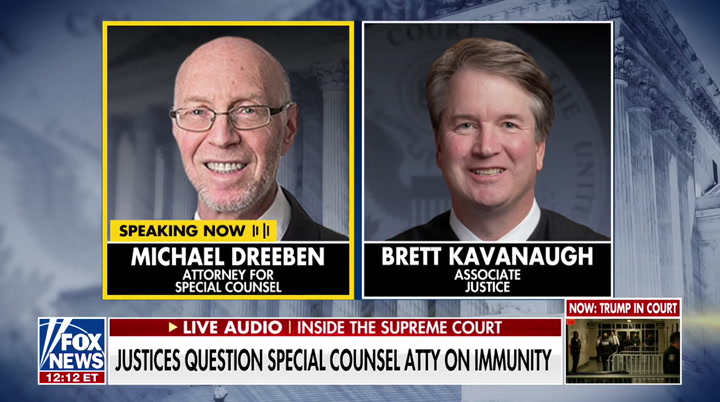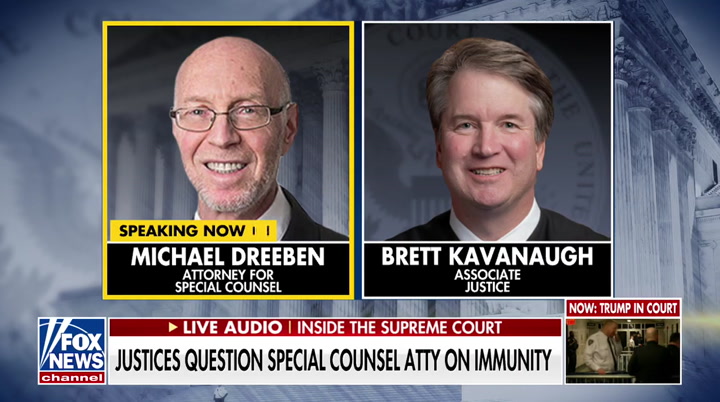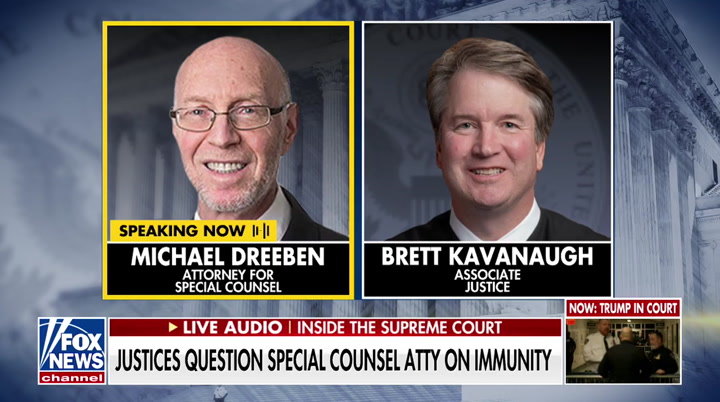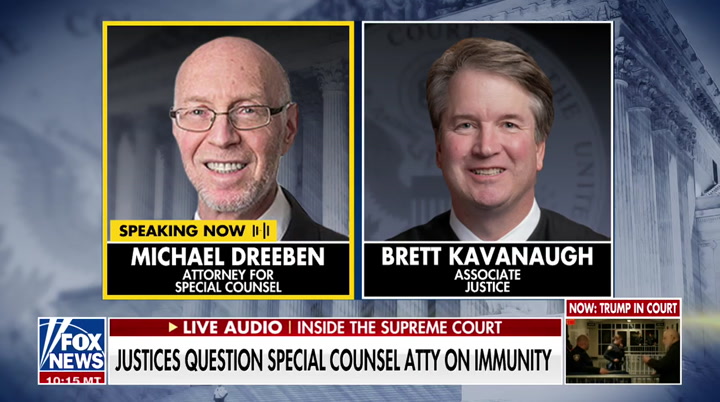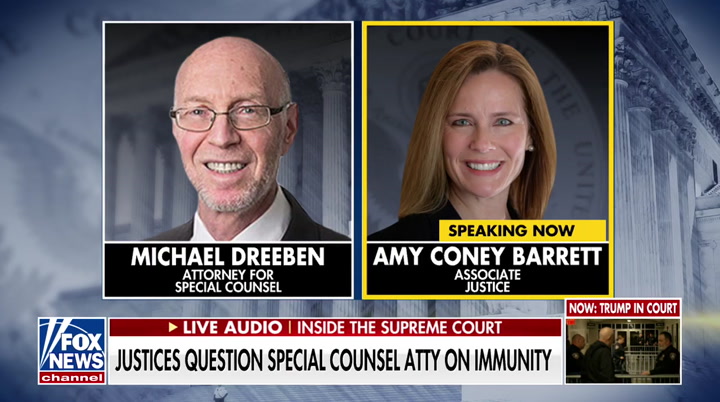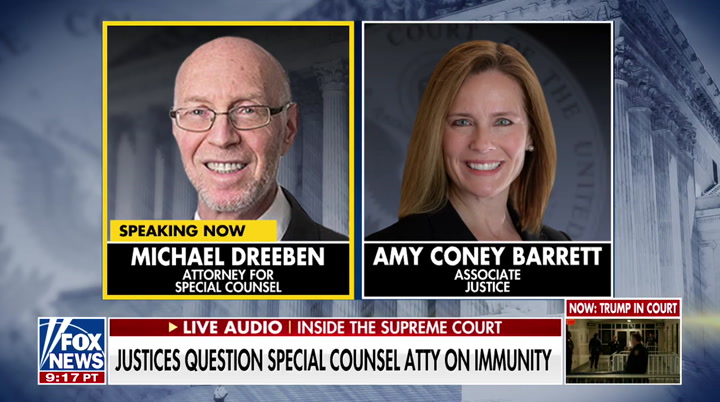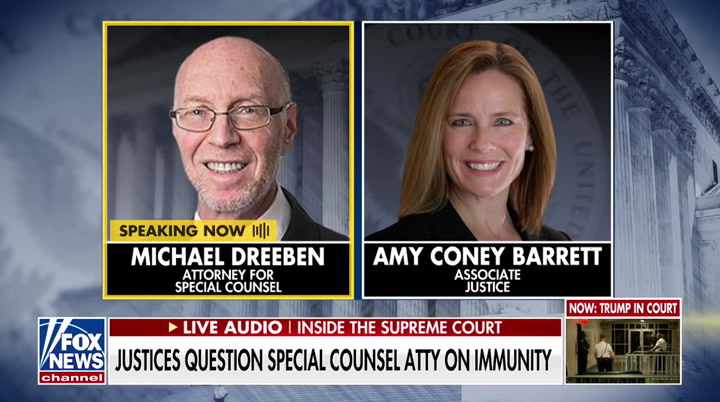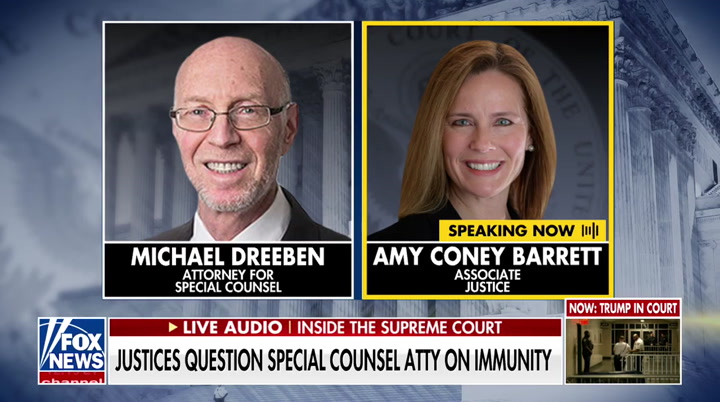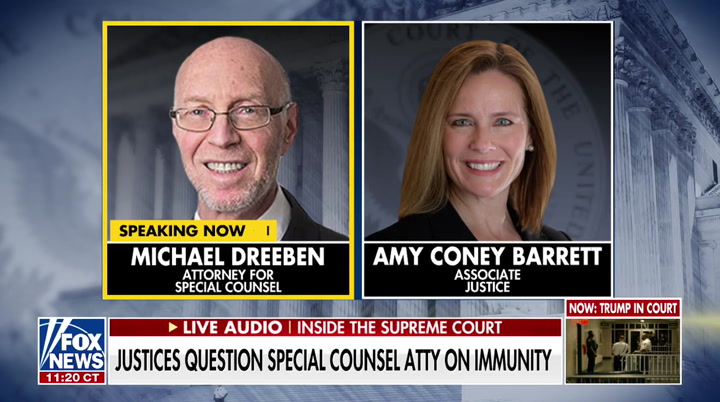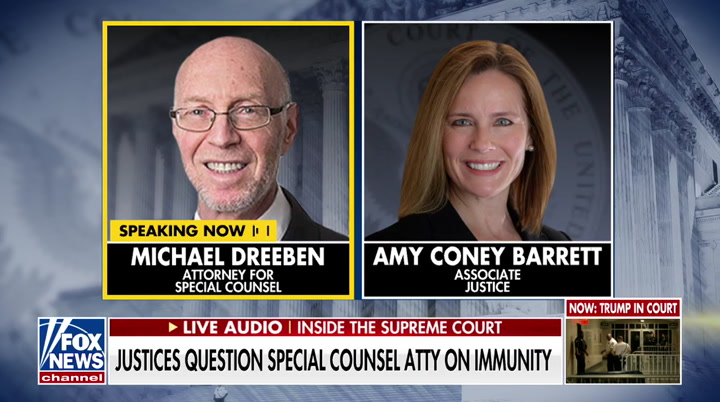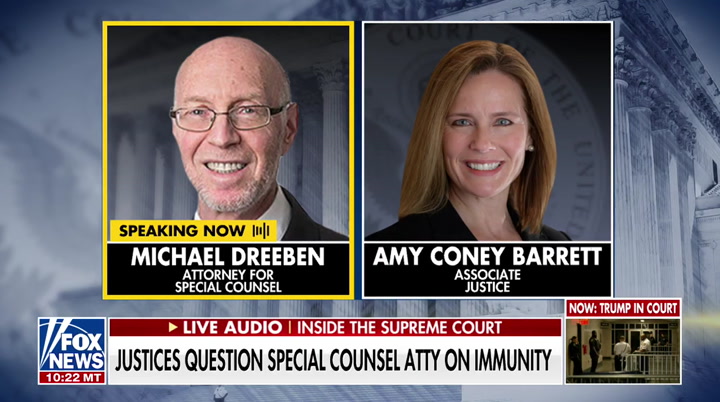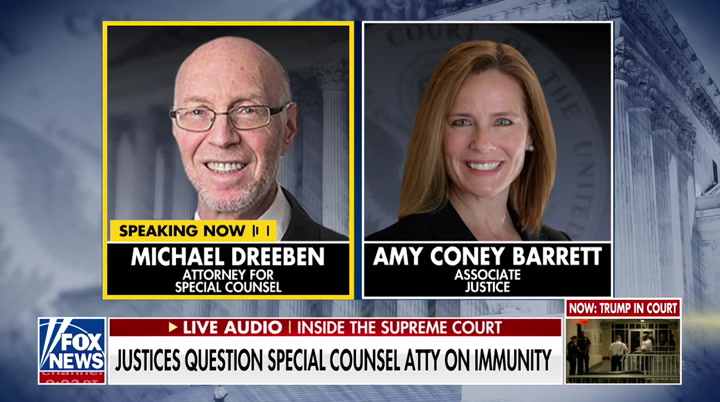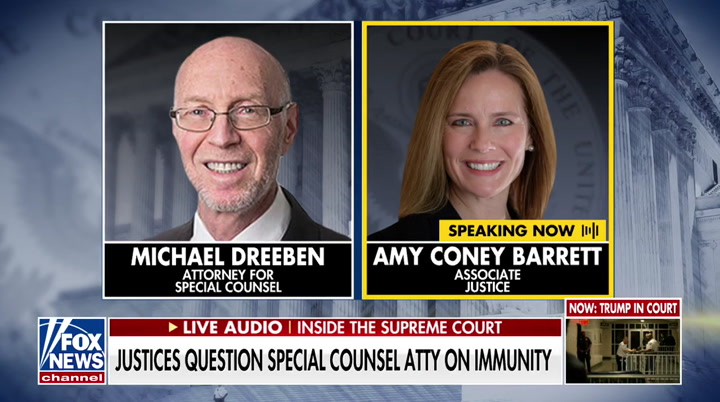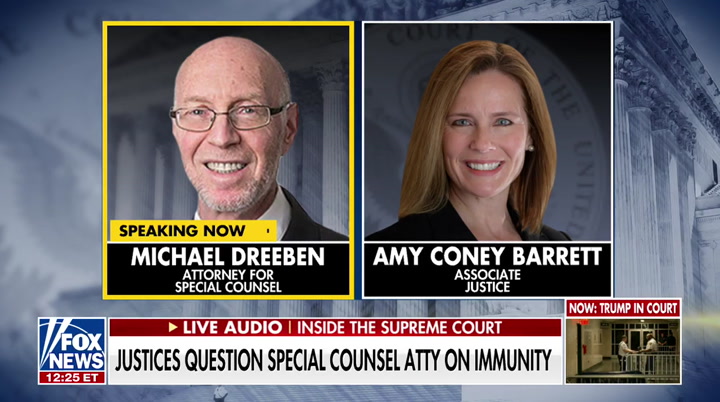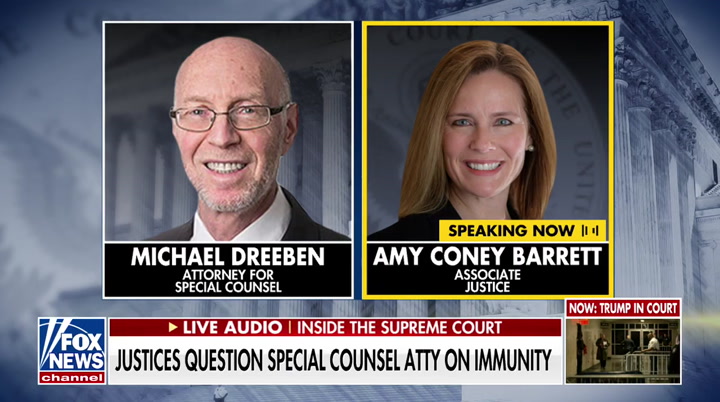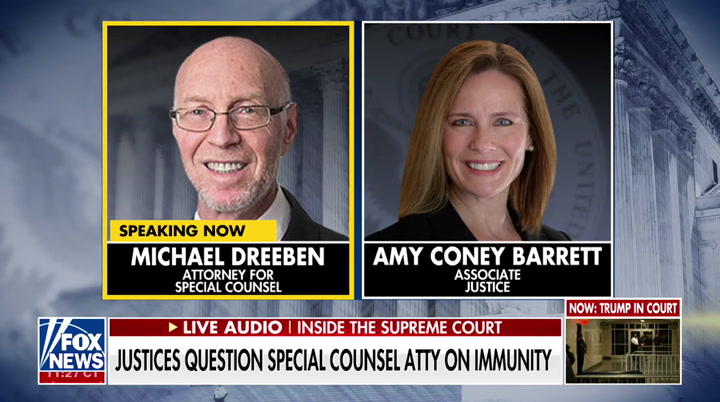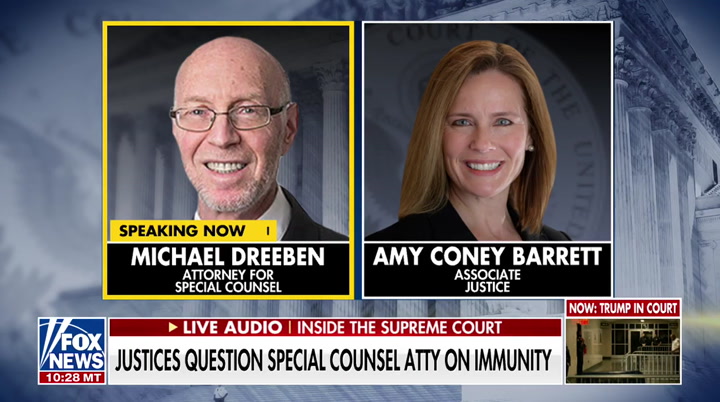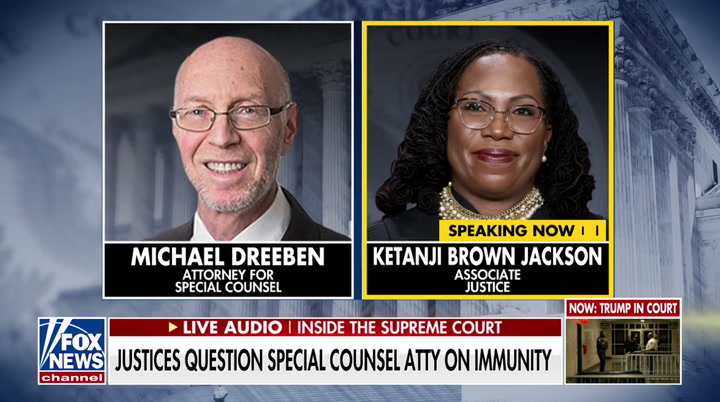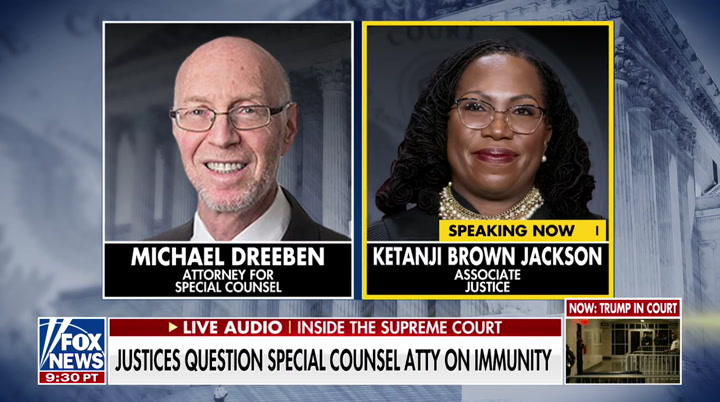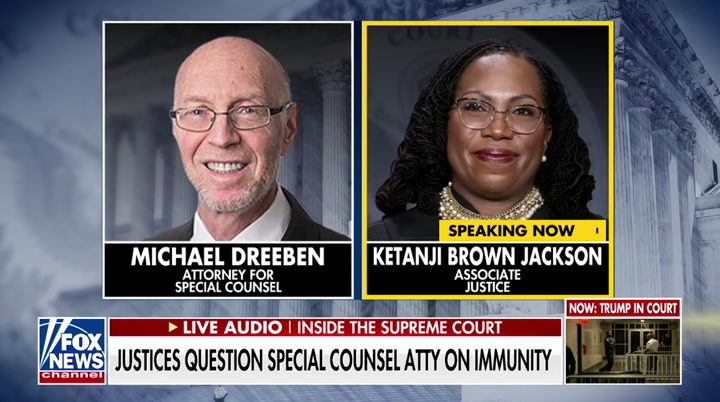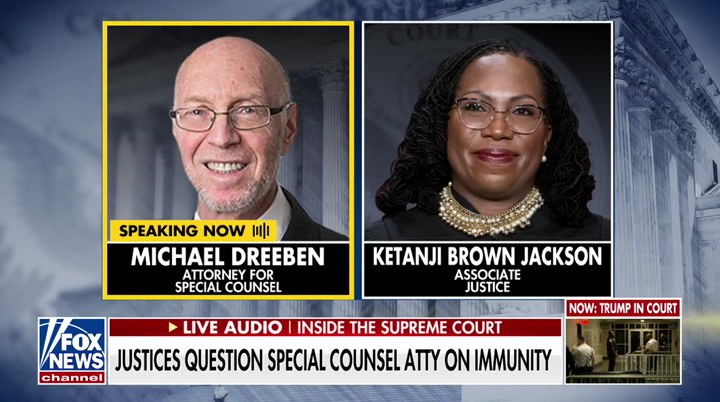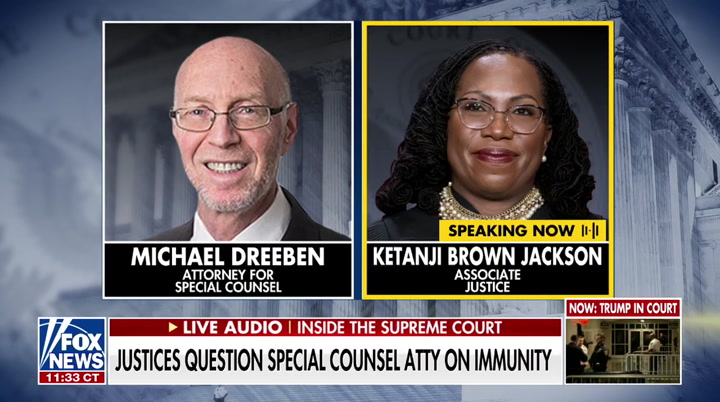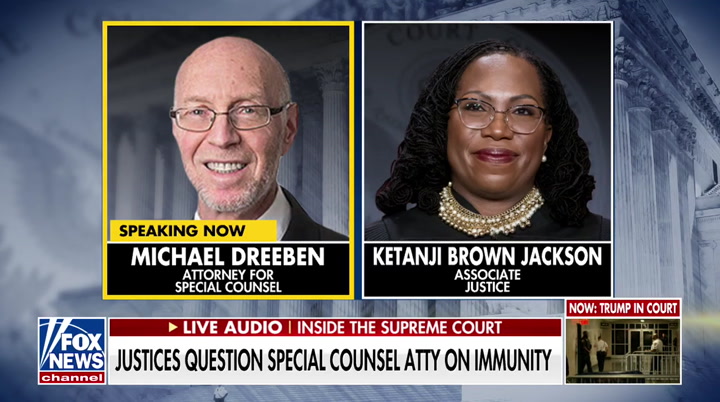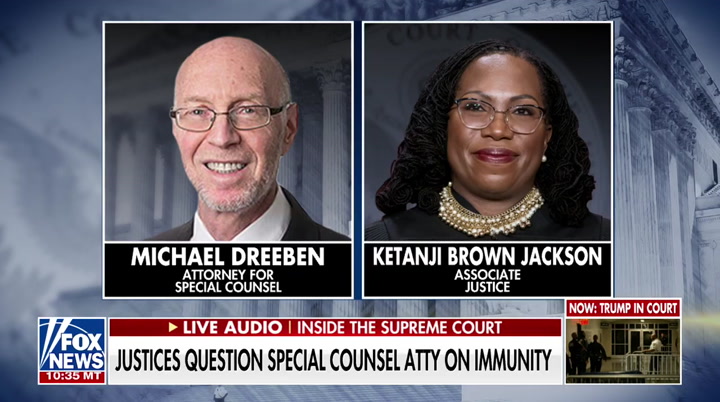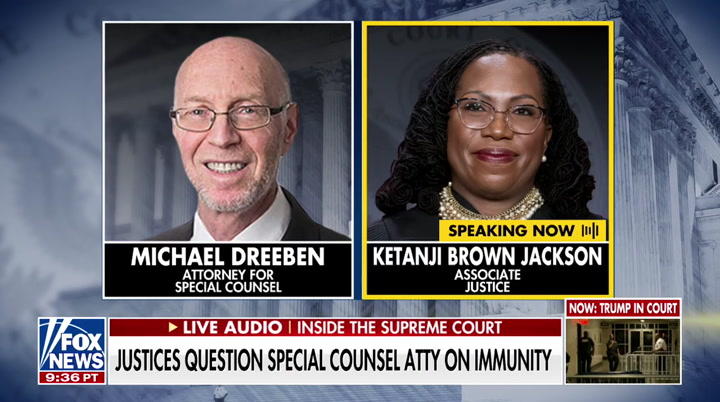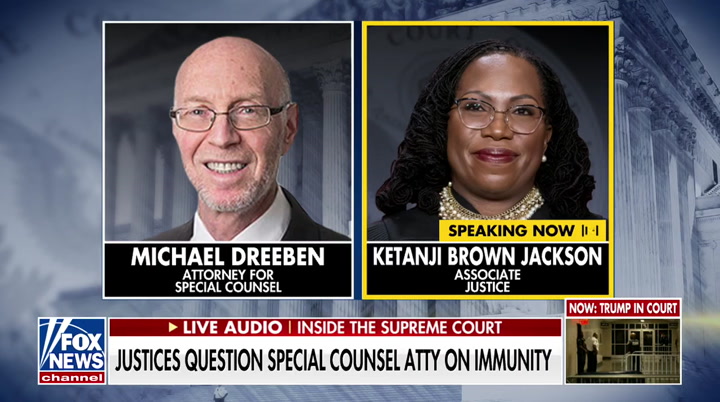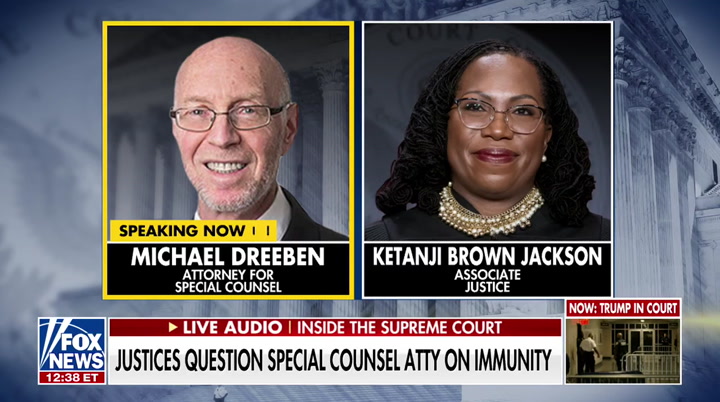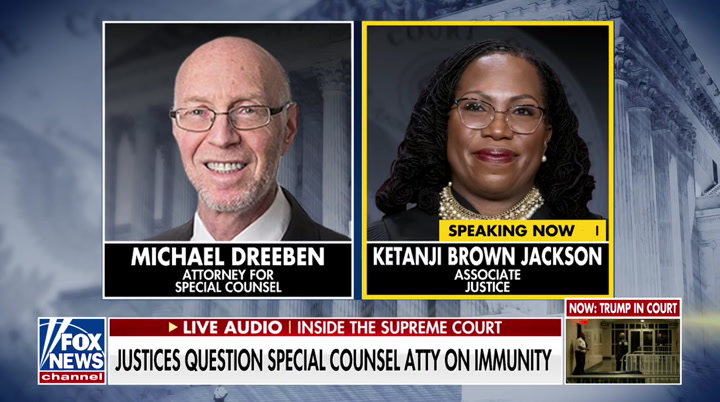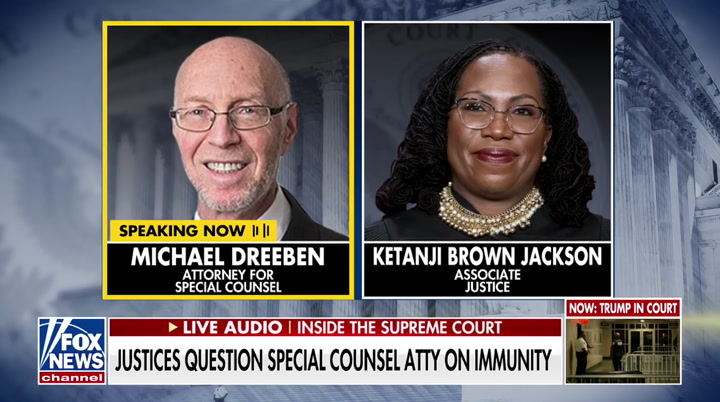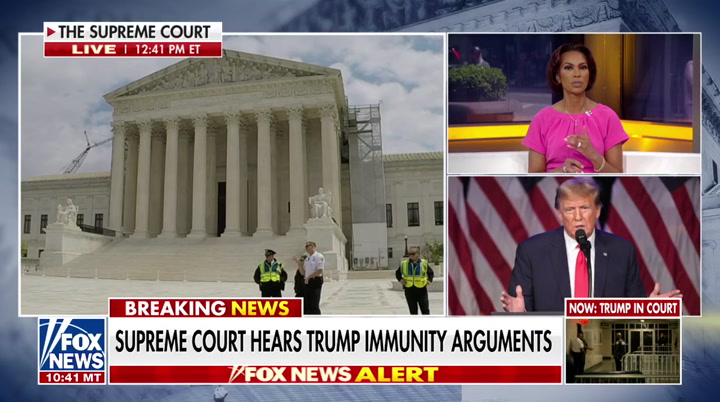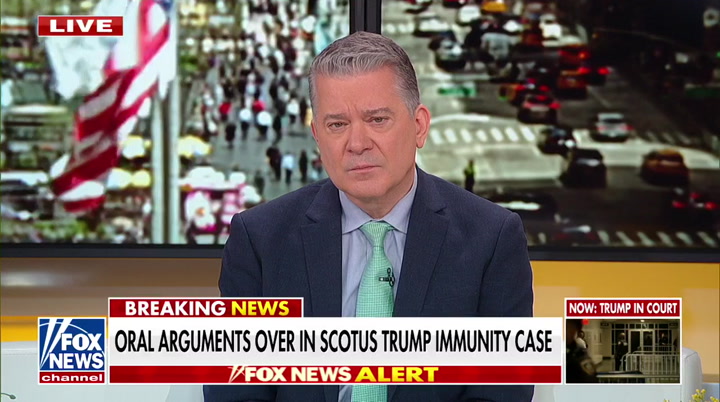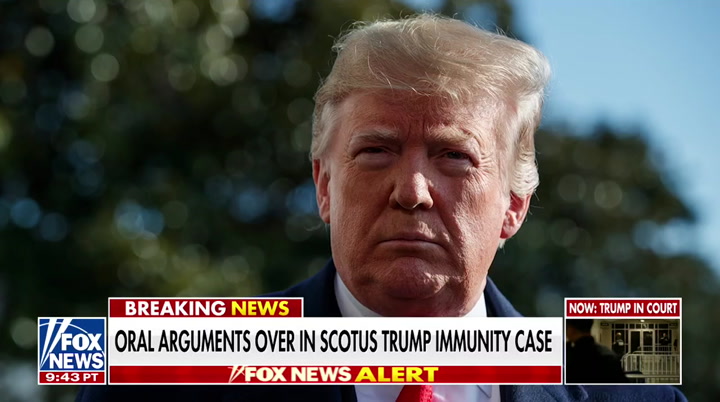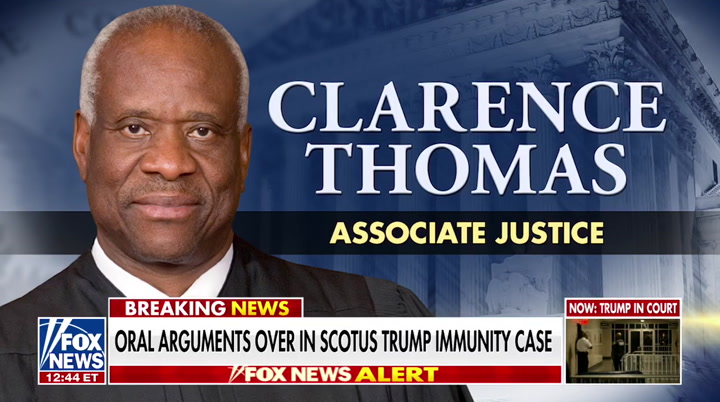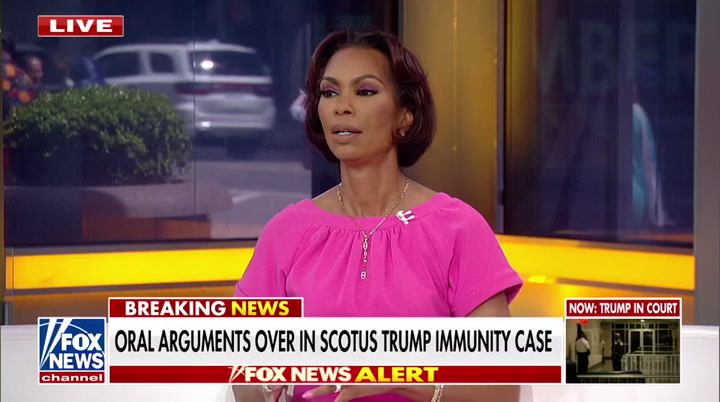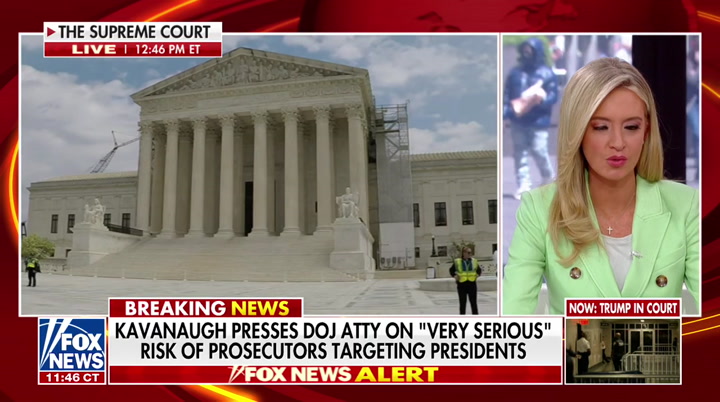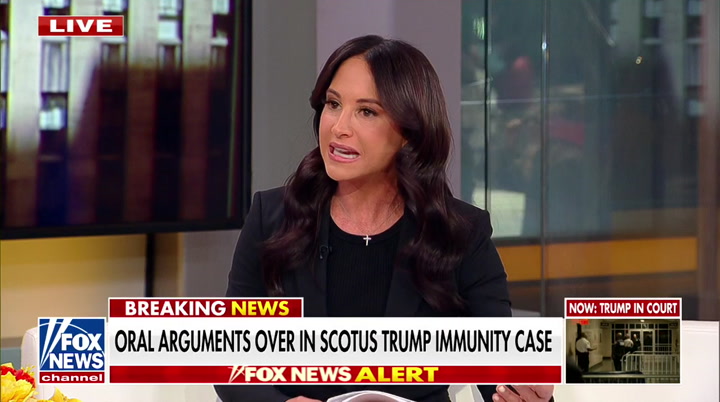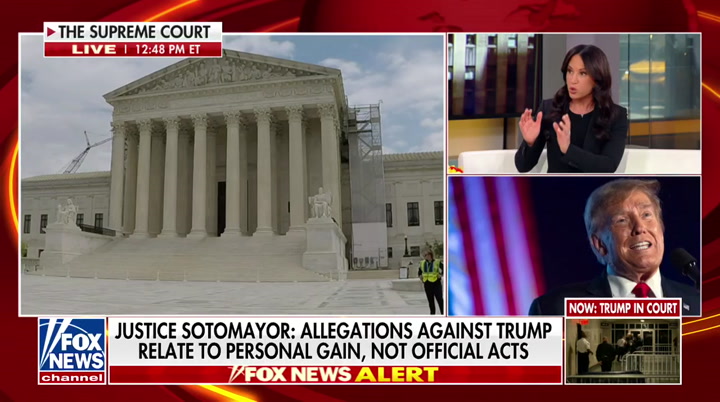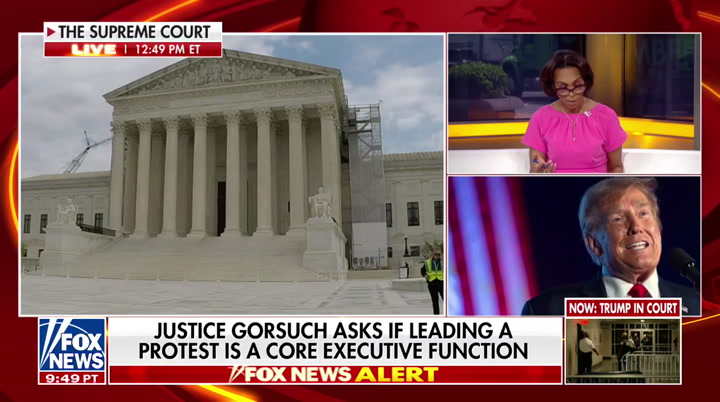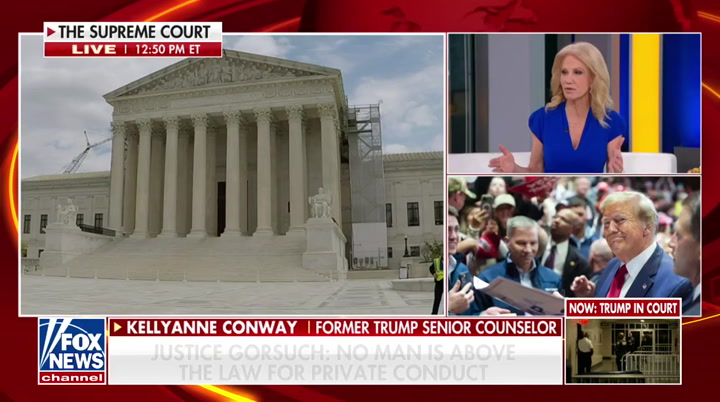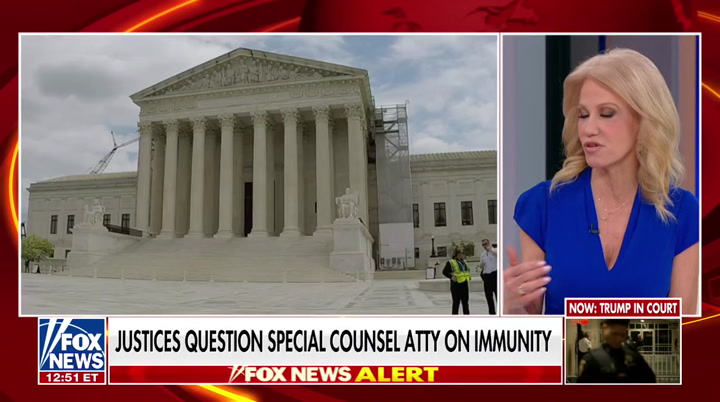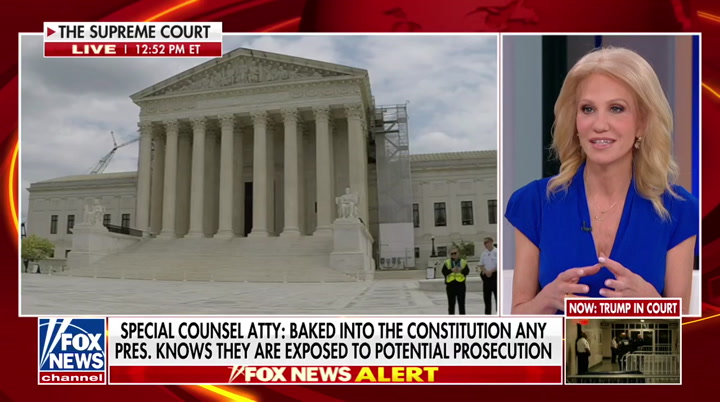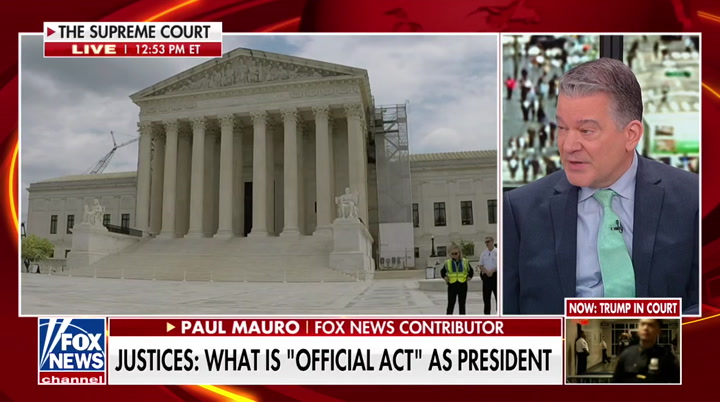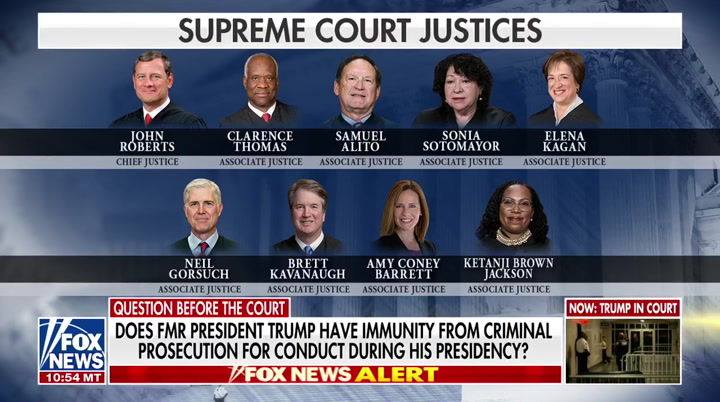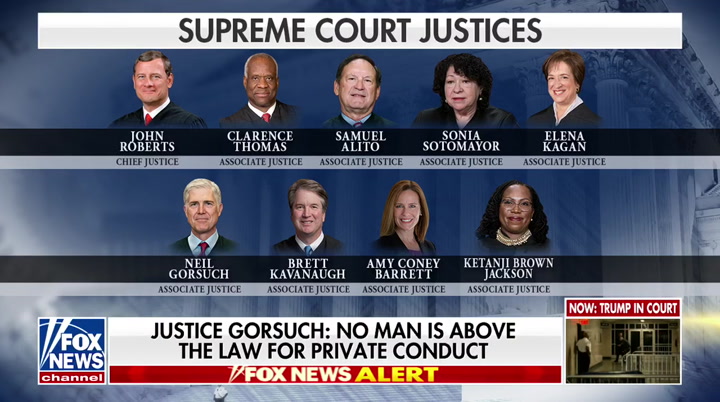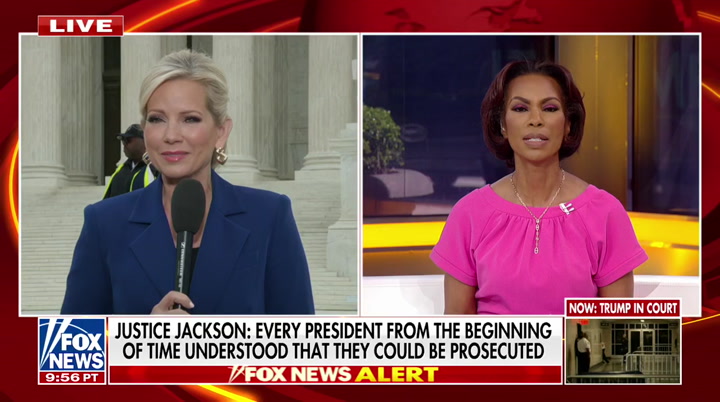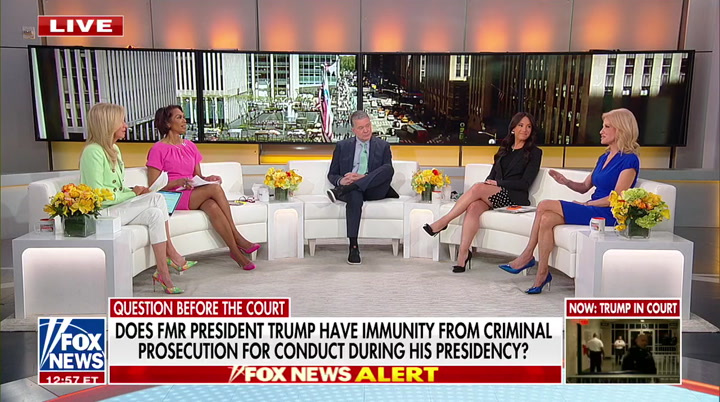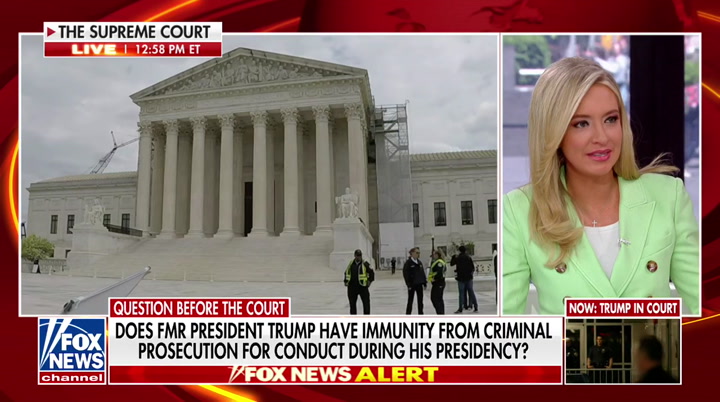tv Outnumbered FOX News April 25, 2024 9:00am-10:00am PDT
9:00 am
applies in the criminal code. >> i understand that. putting that aside, the distinction between official act and private office seeker, their test is you think good enough for government work? >> on this one, the department hasn't taken a next step since the blasting game decision. that decision focused on objective contextual indications to see whether the president was acting as a campaigner as opposed to an office holder. i think that that decision can also be made by looking at what the president actually said. let me illustrate that with an allegation i think my -- >> briefly. >> in one of the interactions between petitioner and a state official, and the state official, petitioner is alleged
9:01 am
to have said all i need you to do is to find me 11,000 votes unchanged. i think if you look at that context it is pretty clear that petitioner is acting in the capacity of office seeker, not as president >> i am focus on the legal test. i am not hearing any objections to it. >> other than i think the d.c. circuit place more content consideration off limit then i went. >> i want to understand on the court immunity, or whatever word we use, it seems to me that we are narrowing the ground of dispute here considerably. do we look at motives? the president's motives for his actions? for example, he has lots of power as we've discussed, but he might use them to enhance his election in his personal interest. it is not a relevant
9:02 am
consideration when we look at core powers? >> i think of this more as looking at the objectives of the activity as opposed to the subjective motives in the sense that you are -- i think there is concern about seeing a electoral motive to be reelected as such. >> every first-term president can be seen through a prism by critics at least, of his personal interest and reelection. so you wouldn't want that, i think you would say, personal motivations are off limits with respect to the core powers. >> probably come out with respect to the core powers, those are things that cannot be regulated at all. >> regardless of motive. so then, we are in the non-core powers where we are fighting over, what role do motors play there?
9:03 am
one could remove a appointee -- first of all let me ask this first, is removing a appointee, a presidential appointee it core power or a non-core power? >> here i need to differentiate between the principal officers that this court in cases such as myers and the seal of the law regarding having constitutional powers to be removable at will. what congress has some regulatory latitude to impose restriction on removal. >> yes i understand that. >> putting that aside, pointing a principal officers at core power, i am not prepared to say that there is no potential criminal regulation to say that you cannot do it for a corrupt purposes to enrich yourself for example. >> but, that is why i am wondering, the motives come into the core power analysis are not.
9:04 am
i thought i heard no, now i am hearing may be. >> maybe is more appropriate because it is not involved in this case, the department has not had to take a position on exactly how these core powers would be resolved under -- as applied in this constitutional analysis. it is not as involved in this case. >> i am not concerned about this case so much as future o ones, but these non-core powers, and then these core powers, where president is acting with at least in part, a personal interest in getting reelected, everything he does, he wants to get reelected. if you are allowing in motive to color that, i am wondering how much is left, either the core or non-core powers? >> i would be fine with carving that out and deeming that to what is intrinsic in our
9:05 am
system, if somebody makes an announcement that says this program will be good to the united states and somebody could come along and say you only did it to get reelected, leaving aside whether any of that is criminal law, i know the next question is assuming that it does, i am doubtful that it is fact does because i do not think they operate on motive as opposed to objectives and purposes. >> intentions aside -- frame of motive is an intention -- so let us put it aside. >> okay, putting that aside, that to me falls in a very different category. it is also -- >> there are some motors that are intense, that are cognizable and others that are not. it is awkward right when we look back at the injunction back to the early cases, you cannot -- you can hold him in contempt.
9:06 am
for sure. >> allow me to try one more time to clarify -- >> just a moment, it did not matter what the president's motives were, we are not gonna look behind it. the same thing and nixon, we said my goodness, nixon versus fitzgerald, but is something courts should not get engaged and because presidents have all manner of motives, i am not concerned about this case, but i am concerned about future uses of the criminal law to target political opponents based on accusations about their motives. whether it is reelection, or who knows what corrupt means in 1512. we do not know what that means. maybe we will find out sometime soon. but, the dangerousness of accusing your political opponent of having bad motives, if that is enough to overcome your core powers, or any other limits,
9:07 am
reactions? thoughts? >> you are raising a very difficult question. and that is the idea. >> yes testing the limits of both sides argument. >> i'm going to say this, that is really not involved in this case. [laughter] we do not have bad political motive in that sense. >> i appreciate that but we do appreciate that we are writing a rule for the ages. >> yes, i stop by looking at the statutes and seeing what restrictions they do place on the president's conduct. for example, the statutes have prohibits for fraud to defeat the lawful function of the united states. the statutes define what the purposes are and what the defendant has to have in mind. to defeat something the united states is doing and it has to be by deception. do not think that gets us into the realm of motive hunting, and the area where we are as concerned as the court would be about doing something that would
9:08 am
undermine the presidency and the executive branch. 1512 seed two, we may have different fuses on the clarity and the scope of that statute. i think if the court does interpret correctly as involving a consciousness of wrongdoing and elevates that the consciousness of illegality, then we are in a different realm wanted to get out reelected is not an illegal motive. you do not have to worry about prosecuting presidents for that. >> thank you. >> justice kavanaugh? >> as you have indicated this case has huge implications for the future of the presidency in the future of the country in my view. you referred to the department a few times as having supportive positions. who in the department is a part of the attorney general? >> the solicitor general of the united states, part of the way in which the special counsel functions is as a component of the department of justice.
9:09 am
the regulations that we reach out and consult and on a question of this magnitude that involves equity that are far beyond this prosecution if the questions of the court. >> okay, second, i am not focus on the here and now of this case, i am very concerned the future. i think one of the court's biggest mistakes is wilson versus olson. that was at terrible decision for the presidency and for the country, not because they were bad people who were independent counselors. but it was because president reagan's administration and president bush's administration, and president clinton's administration, they were really hampered in their view. all three, by the independent counsel structure. what i am worried about here, is that -- let us relax article two
9:10 am
of it for the needs of the moment. i am worried about the situation of playing here. that w was a prosecutor investigating a president and each of the circumstances, and someone picked from the opposite party. the current president. usually, that is how it works, and justice gildea we wrote that the fairness of a process must be judged on the basis, and what it permits to happens and know what it produces in a particular case. you have emphasized many times the regularity of the department of justice. he said, and this applies to the independent counsel system, and it could apply if presidents are written in the subject to investigations going forward. one thing is certain however, it involves investigating a particular individual. can one imagine a manner of filling in the investigation and prosecution, what would the reaction be if the area was not covered by the statute and the justice department posted a
9:11 am
public notice inviting applicants to assist in investigation and possible prosecution with a certain prominent person. this does not invite with justus jackson says of taking the med in search of the law books and putting investigators to work to pen some offense on him? to be ensured that the investigation must be related to the criminal offense specified by statute, but that is often then nothing that prevents it from being very broad. i paraphrase that at the end referring to the judges. what is the concern going forward, that the system, when former presidents are subject to prosecution in the history of wilson versus olson, they tell us it is not going to stop. it will be cycled back and used against the current president or the next president and the next president after that. all that, i want you to try and weigh that concern. why is this not olson versus
9:12 am
wilson if we agree with you? >> first of all, the independent counsel regime did have many structural features that emphasize a independence at the expense of accountability. we did not have that regime now, but even under that regime justice kavanaugh, if we look at the report on iran-contra, a ghost of a fundamental point for the court to consider. judge walsh said i investigated these matters, but the proof did not really come close to establishing criminal violations. we have lived from watergate through the present through the independent counsel error with all its flaws without these prosecutions having gone off a runaway train. >> president reagan, president bush, and president clinton, whether rightly or wrongly that contrary to what you said.
9:13 am
>> nobody likes being investigated for a crime but it didn't result in the kind of vindictive prosecutions that i think, your honor, is raising is a possibility. we have a different system now, there was a consensus throughout washington that they were flaws in the system, it lapsed, and we are now inside the justice department with full accountability resting with the attorney general. so, the special counsel regulations now do not operate the way the regulations do and this quote would have something to say about it i believe, if the independent counsel statute were revived. i am not sure anyone is in favor of that. >> i was just saying that this is the mirror image of that, one way someone could perceive it. but i think your point about the different structural protections internally. let's justice gildea said, i did not mean to suggest anything of the sort i am not talking about the present case. i am talking about the future
9:14 am
you also talked about the criminal statutes. it is very easy to characterize presidential actions as false or misleading under vague statutes. so, president lyndon johnson states that the max davis about the vietnam war, said something is false. turns out to be false. he says something false about the vietnam war. >> this is an area that i do think that it narrowed some nuanced consideration. statements that are made by president to the public, they are not really coming within the realm of criminal statutes. they have never been prosecuted, and i realize that the court can say, what if they were? you get to what i would regard as a hard constitutional question, that would probably guide the court away from try to resolve today, although i do think it is very different from our case and distinguishable and important in other ways, but you are dealing with two branches of
9:15 am
government that have a paramount interest in the integrity and freedom of their interactions with each other. on one hand, the president of course should be very free to send usually, his cabinet official and some cabinet officials to testify in the congress to provide them with information needed to enact legislation and to make national policy. and we are very concerned about anything that we will overpower that. on the other side of the equation congress has in a compelling interest in receiving accurate information and at the very least, that information that is intentionally and knowingly false. that would pollute the legislation process. >> this came up before, president ford's pardon. very controversial in the moment. hugely unpopular, probably what he wants and 76. now, he is looked upon as one of the better decisions made by president your history by most
9:16 am
people. if he is thinking about -- if i grant this pardon, to richard nixon, could i be investigated myself for obstruction of justice on the theory that i am interfering with the investigation of richard nixon? >> this would fall into that small court areas that i mentioned to the other justices, of presidential responsibilities that congress cannot regulate. >> how about president obama's drone strikes? >> at the office of legal counsel look at this very carefully and determine the number one, the federal and murder statute does apply to the executive branch. the president wasn't personally carrying out the strike but aiding and abetting the laws are very broad, and determined that the public authority exception that is built into statutes, and that applied particularly to the murder statute because it talks about unlawful killing, it did not apply to that drone strike. so this is actually the way the system should function, and the department of justice takes criminal law very seriously.
9:17 am
it runs it through the analysis very carefully with established principles and it documents them and explains them and then the president can go forward in accordance with it. there is no risk of prosecution for that course of activity. >> thank you for your answers. >> me pick up with the public authority defects, i am looking at the llc memo that gave them there and wrote that he said in your brief. he describes the public authority defense setting the model penal code that there are a few different definitions, but i will highlight this one, justifying conduct which is required or authorized by the law that defined the duties and functions of a public officer, the law governing the armed services or any other provision of law, and imposing a public duty. that sounds a lot like dividing line between official and private conduct. i think it is narrow and i recognize it as a defense and
9:18 am
not a immunity. but when you look at the definition of this are you acting within the scope of authority conferred by law, i think it is narrow, but that is what it sounds like you and me. do you agree or disagree? >> justice barrett i certainly understand the intuition that when you act outside your lawful authority you gone into a decoy that you are no longer carrying it out i don't think that quite works for a presidential activity. the only way he could have implemented the orders is by exercising his commander-in-chief authority over the armed forces or his authority who is supervising the executive branch those things that i call executive asked there is a possibility with a unlawful executive act. >> i am not sure i understand your answer, i was thinking that it seems to me in your briefing as well as today, when you refer to the public authority defense, it is one of the built-in
9:19 am
protection defense because in some of these instances, when the presidents take action, it might result in criminal prosecution but you say, it can raise this public authority defense. so i am saying, isn't this public authority defense, it is raised, doesn't it sound like a defense that says, that i was authorized by law to discharge dysfunction? >> therefore i acted lawfully. >> yes, and then not criminally liable? does not involve a look at the motives? getting to let the other justice was asking. could you sell it was acting within the scope of my authority by granting a pardon and removing a cabinet officer? but then the public authority defense might not apply because you had a bad motive by doing so? >> i do not think so. it operates based on objective facts, disclosed to council, and then the council provides the device, such as the department of justice, and it's a
9:20 am
objectively violent offense and a complete defense. >> so what would be so bad? one thing that strikes me is different between the public ability defense and the immunity is entered terry lockett appeal -- what would be so bad about having a question like tht the threshold. having it be an immunity? the same type of question that could be brought up as a defense later but be brought up as a immunity and it would be a freedom from standing trial but not to get out of jail free card? >> i understand that, and if the court believed that that was the appropriate way to cracked presidential protections, and has the authority to craft procedural rules that implement its article to concerns. that being said, public authority is a difference -- but under many statutes it's actually an exception to liability itself.
9:21 am
what you are really talking about is trying the general issue. and generally in criminal cases, even cases that involve first amendment issues like threat statutes, the jury is the determinant of the facts. and i have a little bit of difficulty with the idea of trying the whole public authority issues separately to the judge. and have been that go up on interlaboratory appeal with a review of facts before he could ever get it forward into a criminal case. that being said, i would prefer a regime in which the court altered some of the procedural rule surrounding the president then a total absolute blanket immunity that takes away the possibility of criminal prosecution, even if it was a core violation of the statutes in the case of attorney general advice and has no overriding public -- >> you think it has to be a jury question?
9:22 am
i wasn't proposing treating it as a defense that was done by outside and then subject to appeal, i was proposing what about a immunity doctrine at the department of justice thinks would otherwise apply? so go with me on that for a moment? will he be so bad for her to not be a jury question because it seems to me some of this article two contains would be exacerbated by having it go to a jury rather than the judge? >> some of them are. they are judge questions that could be resolved in the face of the indictment. if the department of justice ever return an indictment that said the insurance of this pardon the series of pardon constitutes this series of justice, i have a little difficulty hypothesizing it, but emotion could be made on the face of the environment that says article two precludes congress from regulating these activities in the indictment needs to be dismissed. if the quote wishes to attach to that kind of rule, interlaboratory appeal, then
9:23 am
that would be a lesser safeguard than the one that my friend is proposing here. other kinds of differences however, they really do intersect with the general issue. and for those, i have a much greater time seeing how the court could implement that. and with that because in going to trial? yes. there is no perfect system here. we are trying to design a system that preserves the effective functioning of the presidency, and accountability of a former president under the rule of law. in the perfect system that calibrates all of those values, is probably not being device, the system that we currently have which pretty well. and meet great neck to feel and subsidiary rules but it is different from the radical proposal. >> i agree. let me ask about state prosecutions. because if the president has some type of immunity that is implicit in article two, then that immunity would protect them
9:24 am
from state prosecution as well? a lot of the protections that you are talking about our antenna protections at the federal government has, protections and the department of justice which obviously are not applicable in the many, many, many state and local jurisdictions across the country. what you had to say that? >> that raises a supremacy clause issue, and the court would run a supremacy clause analysis that would probably start with basic principles such as mcculloch versus maryland. the states do not have the authority or the burden of federal function, and then they were kind of mood through in re nagel where the court said that a state motor prosecution were a federal official was guarding a supreme court justice and who fired the shot was not permissible. if the court thought that you needed a more categorical rule for the states, i think the supremacy clause certainly leaves it within the courts prerogatives to determine that the president on that all other
9:25 am
officials deserves more of a robust federal offense that will have just described. >> that is my point, it is one thing to say what the president, they are not going to be these prosecutions that are politically motivated and the things that justice kavanaugh was referring to, that might be the danger of the system. one thing we have to weigh about, but is certainly a concern, it is totally different when you take it outside of the department of justice and its structures, and then you fill it out elsewhere, the idea across the states, the idea of an immunity has a lot more purchases were talking about something that protects the former president from standing trial in the at the state and local level. >> i do not know if you would have to design a system in which the president would have to stand trial of the state or local level. certainly within the court's authority as a matter of supremacy clause law to find an immunity. but we have been talking here
9:26 am
about the distinction between the official acts and the private acts. that will have to be determined by some sort of process and any immunity defense that the court announces can still be met by a state of station that we are prosecuting private conducts you are going to have to have some process. having some legal process is not a reason to cast aside a new one system that actually looks at what protections are necessary as opposed to what was provide the absolute maximum insulation for former presidents even if we acknowledge that it is highly prophylactic. >> i agree and i was in contrast and absolute rule, but if there was some sort of official private and consequence towards making immunity. since you bring up the private acts, my last question, i had asked mr. sauer on page 46 and 47 of your brief, they say even if the court were inclined to
9:27 am
recognize some immunity for former president's official acts should be remand for trial because the indictment has private conduct and you said that the private conduct would be sufficient? the special counsel expressing some concern for speed and wanted to move forward? so the normal process with what mr. sauer asked would be for us to remand if there were some official acts of immunity. to let that be sorted out below. it is another action for us to proceed and drop the official conduct? >> to things on that, first of all there is really an integrated conspiracy here that has different components as alleged in the indictment. working with private lawyers to achieve the goals, and as i've said before, the petitioner is reaching for his official powers to try and make the conspiracies more likely to succeed. would like to present that as a integrated picture to the gerry
9:28 am
smith sees the sequence and the gravity of the concept and what each step occurred. that being said if the court were to say that the fraud or electoral is private, and trying to exploit the violence after january 6th, by calling senators and saying please delayed that acidification proceeding is private campaign activity, we still think contrary to what my friend said, that we can introduce the interactions of the justice department and the efforts to pressure the vice president for the evidentiary value on showing that defendants knowledge and intent, and we would take a jury instruction that i would say you may not impose criminal culpability for the actions that he took, however you may consider it so far on intent, but that is the usual rule unprotected speech on wisconsin's versus mitchell, we mentioned this but we do not think their speech or debate
9:29 am
clause has any applicability here, some very explicit constitutional protection that says senators and representatives should not be questions and any other place. so it carries a evidentiary component that is above and beyond whatever official acts immunity he is seeking in the last thing i would say on this is we think that the concerns about the use of evidence about presidential conduct that might otherwise be official and subject to it triplets is already being taken care of by the united states versus nixon. that balances the president's trust on confidentiality, for all available facts to get to the truth. once that has been overcome we submit that the evidence can be used even if culpability cannot rest on it. >> thank you. >> justus jackson. >> to pick up a where she left off, i think i heard you say even if we decided here, a rule that is not the rule that you prefer, that is somehow
9:30 am
separating out private from official acts, and saying that that should apply here, there is sufficient allegations in the indictment and the governments feel that fall into the private acts bucket that the case should be allowed to proceed. because in a ordinary case, it wouldn't be stopped just because some of the acts are allegedly immunized, even if people agree that some are immunized. if there are other acts that are not the case would have gone forward. >> that is right. >> going back to the clear statement, the clear statement argument, i am struggling with that argument because my understanding was that when a charge criminal statute was read narrowly in the presidential context to not apply to the president, a constitutional question is being avoided. so you are doing that to avoid having to deal with the constitutional questions. so, what is the constitutional question that is being avoided
9:31 am
in those type of situations? >> a serious one. this is just an application of this course ordinary construction of criminal statutes that if there is an available interpretation that would avoid a serious constitutional question, the courts preference is to -- >> yes, but the nature, my understanding is that what is being avoided in that situation is the question of whether a former president, can be held criminally liable for doing the alleged act that is being asserted in that statute. consistent with the constitution. we look at the statue, we have some elements in it. and we are saying, jeez, if the statute and those elements apply to the president's conduct in the situation, we would have to answer the question, can the president be held liable consistent with the constitution for the behavior? is that right? >> the first step in that analysis, i just want to -- the first step is, is ambiguity?
9:32 am
these statutes apply to any person they apply to whoever and there is no ambiguity in those phases court concluded that similar words that any person apply to government officials -- >> just assumed that i am just trying to get we are avoiding a constitutional question if we do that. in the ordinary case. and what is confusing to me about this case is that we're dropping us to avoid the constitutional question, in fact, the question of whether or not the president can't be held liable, consistent with the constitution or does he have immunity is the question that is being presented to us. i do not understand how the clear statement analysis, how this even works. it seems illogical to me, for us to hold that presidents cannot be prosecuted under and a criminal statute without a clear statement. from congress. to avoid the question of whether
9:33 am
or not the constitution allows them to be prosecuted. we would have to have a reason. we would have to have a rationale for applying the clear statement rule. >> we would have to have some rationale that is not evident in either the existing doctoring or the text. one data point for the court and thinking about how the clear statement rule works, and united states versus son damon, a case about gratuity, the court is probably familiar with, justice gildea wrote an opinion for a unanimous court where he use a hypothetical about what would happen if the president received a sports replica jersey at a typical white house event with that violate section 201c. and the court offered a construction that i had to be for the cousin official act to avoid that problem. there was such a well-received understanding that presidents are not included in general or federal or criminal law, unless the president is specifically named which he is not and
9:34 am
section 201, justice scalia would've thought of that, and some members of the court would have reacted. >> okay, then they go on to ask about what you take the petitioner's position to be in this case, because we had a lot of talk about drawing the lines, justice kavanaugh, and the justice court chick suggested we should be thinking about/thinking and that -- first we have private that official and with official now we have something that cora asked this is other acts as to try to figure out at what level the president is going to have immunity i took the petitioner's argument, and this case, not to be inviting us to engage in that type of analysis. i thought he was arguing that all official acts get immunity. so i did not understand us to be having to drill down on which
9:35 am
official acts do. so my question is why is it not enough for the purposes of this case given what the petitioner has argued, to just answer the question of whether all official acts get immunity? >> that is enough, and if the court answers that question the way that the government has submitted that results the case. i wanted to make a clarification that i may have left the court with some uncertainty about, the official act analysis that my friend is talking about, is the fitzgerald versus nixon outer perimeter test. which is extremely protective of the president. it is not looking at core versus ancillary, it is saying everything the president does is a target for lawsuits, that is not a great thing therefore they are all caught off. >> thought is absolute immunity type of concept. anything that is a fish on the outer perimeter is not subject to liability. so we do not have to then go
9:36 am
well, we have the bucket of official, now let us figure out within that what might be subject to liability not on that subject of absolute immunity correct? >> yes nora on our theory. on his theory everything is protected but there is no immunity but this is where i would draw the distinction. there are a constitutional challenge is that you run through that for a month and this court's customary method of analysis and you determine whether or not there is a infringement of article two. >> what you are saying is even if we reject the absolute immunity theory, it is not as of the president is -- does not have the opportunity to make the type of arguments that arise at the level of this particular act or this particular statute, or has a problem in retrospect. i think i hear you saying that we should not be trying to end the abstract set up those boundaries ahead of time, as a function of blanket immunity.
9:37 am
and allow each allegation to be brought and then we would decide in that context. >> yes, with the additional note that we have never made that argument and i think it would be up to a district court to decide whether or not to go that route at this point in the litigation. he has put all of his eggs in the absolute immunity back for. >> yes, and if we invite or see the question as broader than that and we say let us engage in the core official versus not court and try to figure out the line, is this the right vehicle to hammer out that test? i have understood that the most, if not all, but most of the allegations here, there is really no plausible argument that they would fall into core versus not, such as they are immune. >> we did not think there are any court acts that have been alleged in the indictment that would be off-limits as a matter
9:38 am
of article two. >> so if we do this type of analysis, try to figure out what the line is we should wait for the vehicle that actually presents it in a way that allows us to test the different sides of the standards that we have been creating correct? >> i do not see any need in this case for the court to embark on that announcement. >> okay the final sort of questions i have have to do with what i do take as a legitimate concern about the prosecutorial abuse about future presidents being targeted for things that they have done in office. i take that concern i think it is a real thing. but i wonder whether some of it might also be mitigated by the fact that existing in ministrations have a social interest in protecting the presidency that they understand that if they go after the former guy, soon they will be the calm
9:39 am
the former guy and create this president that will be problematic. so do you want to comment on whether some of the caution from the justice department and whatnot, come from an understanding that they will soon be former presidents as well? >> absolutely. i would locate this as a structural argument that is built into the constitution itself. the executive branch, as this court knows has executive branch interest that at times asserts in opposition to congress so that the functioning of the president is protected. and i believe that value is operated in anything as momentous as charging a former president. >> i would also say that with like for you to comment, presidents are concerned about being investigated and prosecuted and it's chilling to some extent, their ability to do
9:40 am
what they want in office. and that is a concern on one side, but can you comment on the concern about having a president unbounded while in office? a president who knows that he does not have to ultimately follow the law because there is really nothing more than say political accountability, in terms of impeachment? we have amicus briefs hear from professor lederman for example who says, a president would not be prohibited by statute from perjuring himself under oath about official matters. from corruptly altering or destroying documents to prevent them from being using a professional's proceeding. and bribing witnesses and public official. it goes on and on and on about the things that a president in office with the knowledge that they have no criminal accountability would do. i see that as a concern that is at least equal to the president being worried, so worried about
9:41 am
criminal prosecution that he is a little bit limited in his ability to function. can't talk about those competing concerns? >> justus jackson, i think it would be a change to announce a sweeping rule of immunity that no president has had or has needed. i think we have also had a perfectly functioning system that has seen occasional episodes of presidential misconduct. that nixon era is the pragmatic one. the indictment in this case, it alleges another. for the most part, i believe that the legal regime and the constitutional regime that we have works and to alter it, poses more risks. >> think you. >> thank you. >> thank you. >> think you counsel. rebuttal? >> i have nothing for the honor. >> think you consol. >> council of case is submitted. >> at the honorable court is now adjourned until thursday the
9:42 am
ninth of 8 at 10:00. >> harris: okay. the nation got to hear compelling and really interesting, and very different testimonies from this court. and also the representative for donald trump and the representative for the special counsel in this. on the issue of immunity for former president trump. riveting. these oral arguments have just now wrapped up. and the court's nine justices, question attorneys representative as i've mentioned trump asking why does presidential immunity actually stem from? and, to what extent does a president's actions are doing president's actions constitute an official act versus a private one? that was actually a really key point in all of this. and we will get into it a little bit about whether or not they're going to try to decide what is an official capacity of his job,
9:43 am
formerly as president, and what were private asked that he is being looked at for it. and if they were official part of the argument today was whether or not we would decide at that level of the court, and then he could be tried automatically on the private ones. you have to make a really clear which is which. this is "outnumbered." i am harris faulkner with michael ojo emily compagno, and kayleigh mceany. also joining us today, fox news contributor and former senior counselor, to president donald trump, kellyanne conway. and fox news contributor, paul mauro. first let's go live to a correspondent, who is live outside the u.s. supreme court. this really ticked along, and we did not hear much from buy any at all from clients, so i'm curious to see what you have to say about that. >> hello harris, we heard a
9:44 am
letter from justice thomas but not from what we've heard in the past two years since he we have heard from these cases. one of these justices, like it or not are now square in the center of the 2024 presidential campaign. no question about it. sometimes you hear these cases and you can get a inkling of how these justices are going to rule, it is a tough one here, this one on almost three hours. this is something that the supreme court typically said an hour or a hour and a half. this was three hours. this case is about so much more than trump, a goes into the future with presidential immunity. the former president charged with attempting to overturn the results of the 2020 presidential election. a train set allegations surrounding a time where he was the president, he says that he cannot be indicted because he ws president, his attorney john sauer pressed on several points and is very arguments a serious and an exchange with justus ketanji brown jackson. >> i am trying to understand what the disincentive is from
9:45 am
turning the oval office into the seat of criminal activity in this country. >> in this case, and with what george washington had said is franklin franklin says we view the prosecution that this is something everyone cried against is unconstitutional. george washington said that we are worried about factional strife. >> here he is questioning the internal representative special counsel, jack smith. >> does the president have immunity or are you saying there is no immunity or presidential immunity even for official acts? >> yes justice thomas but it is also important to put in perspective the position that we are offering the court today. the president as the head of the article to branch can assert as
9:46 am
applied article two objections to criminal laws that it interfere with an official power presented by the president or prevents the president from accomplishing his constitutionally assigned functions. >> the clock is ticking. end of june we should hear something, it could be sooner. here is? >> harris: all right. there are protesters everywhere these days. david, thank you very much. so, kayleigh mceany, you and i got into a detailed conversation this idea of official acts versus private acts. let's bring the audience into our conversation on that. >> kayleigh: this was huge and this is a press of what we've heard if i'm trump and i watch this, i feel good about what i've learned. about these justices, here is why, they both brought up, cavanaugh and , brought up the e
9:47 am
of remanding, sending this back to the local court. in fact justice kavanaugh said that there are some official acts and that analysis should be undertaken by the district court. and john sauer said yes of course. then you go to the other justice, and then you open the possibility of further proceedings. and that is for people who bought a potentially remanding, but there's also the possibility of allowing litigation to play with the official acts and allowing jack smith to continue forward on the private acts. all of this is to say why is this so important? the issue of remanding to a lower court. there was a case called the vance versus trump, trying to get documents for the stormy daniels case and trump said he had immunity but the court said no but they were mandated to a lower court for further proceedings, july and 2020, and the outcome did not come until eight months later february of 2021. so if you get a remanned, you
9:48 am
could g get a smart delay. >> of course a delay as a defeat for the political chase that this has been for democrats. >> emily: so much. there is two things that stuck out to me, and i want to break it down for the viewers. number one is about intent, a few of the justices, they went into -- if you are operating on an official capacity than at what point is in tension separated from motive, and isn't want to listen to any candidate would be acting? of course always been the intention of being reelected and what they've voiced a concern for witches this is what is most important, presidents. they first are concerned that they will establish president and the dangerousness of accusing your political opponent of bad motives and again in this sort of secular argumentation yes my intention was to get a reelected, we all his candidates here, and as pointed out, if you are indeed operating within your
9:49 am
official capacity with specific powers that have been authorized to you and how are you to have a bad motive so look for that to be reflected in the decision and the second thing is one of what petitioner which is what is arguing that all of these behaviors are official so i am immune. what you heard it here the council saying we want you to operate the youngstown analysis and what that means instead of accepting what donna trump sent saying look i am president and i am immune, they are asking the court to apply, 1952 -- >> harris: not even me and i was old -- states rate during the korean war bases the steel industry, what happened to the supreme court? they articulated analysts whether or not he had the power that the president was authorized to do so. >> emily: whether you operate with congress or in void on your own independent authority or
9:50 am
with direct indication of what congress is authorized. does this thing stuck out to me they had a great. >> harris: okay so, kellyanne conway, at one point said that we are not are not endorsing a regime that we think would expose former president to criminal prosecution and bad faith as emily was just talking about. they go on to say for political song -- critically driven prosecution like that would violate the constitution underweight versus the united states. and then kelly who was on set, you did not see this area because we were in the here and watching this weather to pick it up, she said considering what we unseen unfold in new york and i feel politically driven investigation that is kind of rich. >> kellyanne: it is very rich, he has been preparing for this argument so much he hasn't been paying attention to what is happening. let me set the table this way,
9:51 am
the provisions of the protections of the promises of the u.s. constitution apply to all of us. thank goodness. that includes trump, the haters and the critics, who are trying to get trump for ten years now, he may not be above the law, but he is not believed a lot either. and i heard that in some of these justices arguments today at large. justice gorsuch pitch, the future use of criminal law to impute them omits an intensive political opponents is dangerous. he also said something we need to remember, what is the supreme court's job? we are making allow for the ages is not about donald trump. if i was up don't get my joe biden i will be ready today because are we to believe that the joe biden family acts and the gazillions of dollars that they have shoveled in the public acts. he had left the vice president he was not writing yet -- everybody needs to worry. also justice kavanaugh quoting
9:52 am
previous opinions by justice gildea and basically saying that just a scalia, is saying that te question is not really what the law permits. not work at the law produce in any specific case. again they are brought in making things better. if a la trump i would be happy with this because they are three options, full immunity is probably a 10% chance of that and there's no trial. no immunity they're going to have a very quick trial. this is the only thing i've ever seen go quickly in new york city and washington, d.c. places where i've lived, and the only thing -- i do not see that happening. the real man is the best possible outcome for him because i think it will drive on and on, i am not sure they're going to go by the site here you said put forth for the justice who is great. but separating out --
9:53 am
>> harris: that is decided at this level nobody was suggesting -- one person suggested that you kick it out to the district court, but you have what is official versus what is private decided here. it is still going to take some time. all of the involves a delay but does that delay go past the primary season being over and does the delay go past the election being over? >> i would say yes and by the way trump is not available because he is stuck over here. one quick thing, i think the argument was blown up. he basically said that won't this lead us to a cycle where new presidents, go and prosecute their political opponents. and they say we have how this happens in regimes all across the world and it destabilizes the government. the country. the second thing he said was, ," if the president gets advice from the attorney general, that something is lawful is that an absolute defense" this is important because they were receiving information from people i have called out a charlatan and show men's and supplicants in front of the
9:54 am
desk. and finally that information. >> harris: that is very interesting. because who would not take the advice of the top attorney in the united states. i just do not know who that individual would be. really quickly, i want to go to paul and get your thoughts. >> paul: is going to be a very complicated decision will make it up. it could be a while, but i would say it would happen within a month. let's see how it plays off of the election. i do think that reman is most likely the most likely possibility here. it is go going going to town official act, and it's very clear that's one of the things we can probably go to, and i think that justice near that. after talking about how far are we going to take that, going into motive, because you can make the argument that it is the official duty of a sitting president to preserve the integrity of the election. what if -- you notice there's a lot of what if in this
9:55 am
discussion, from the justices, because they understand, as believe that we are speaking for the ages, so let me g give a letter, what is, everything donald trump has said was accurate? what if, in fact, he was preserving an election that ended up going against them? what if a sitting president was preserving the process in a way that actually would end up having him lose, does he not had the ability and that requirement for the american people? it comes down to whether or not preserving the integrity of election is an official act, and that goes into trump's mind, and you're going to see a remanned and it could turn on and tracked as you said emily. >> harris: okay. shannon, this was nearly three hours but it went by very quickly. and as you probably have been hearing from the discussion on the couch, there were a couple of things that official versus private acts was of them.
9:56 am
>> absolutely. and as you may have heard it is quite the atmosphere out here with demonstrators on both sides of this demonstration but it was much more somber inside. you are correct that former president trump did not get clearance to be here so he wasn't here, but jack smith certainly was. when he walked into the courtroom today. it was a real seriousness about the proceedings in yesterday with the abortion case it was much more heated and fiery but today they were plotting through this and everyone is probably talking about that line from justice gorsuch eric that they are writing a will from the age. and they seem to have the weight of that on the today as they went fine extended period of time an extended amount of questions with both of the attorneys and very much wayne this and yes it may come to public versus private that may wind up sending this case back below for further proceedings and it would be a win for the legal team because it would further delay this has been expedited i do not think we will have to wait until the end
9:57 am
of june for this but the justice seem very red and in targeted and they were asking about the anomers volume of pleas that they've gone through such to get to this argument today it felt like inside a somber moment. very quiet very judicious everyone giving the time, like they were yesterday, the real action is obviously here outside and now we wait they will take the first private vote on friday behind closed doors. >> speech of may 9th was mentioned. >> kayleigh: may 9th? >> harris: i wanted to double check with you on what that was about? because we couldn't hear it clearly. >> yes. i do not recall that either i will have to look through my notes but indicating any time at the time period, the justices did not give us any clues today. they generally take a private closed-door vote on the friday after a case and then to begin writing opinions and they confront boats as you know back
9:58 am
and forth in the process and i do think they sure the weight of getting this done quickly but they will not move under pressure if they do not think they are ready. >> harris: music is inviting. [laughter] and you are competing with. god bless you for all of that. we can hear your will. carlee allen, that may ninth gate, when we were coming out, i had written down for a shed or reconvening the proceedings of the u.s. supreme court, but i wasn't quite sure. >> kellyanne: it is a case that does not involve from. they are just saying we will be back on that they. >> the picture on the outside. >> just to point out, it is not hypothetical that the rule for the ages could -- he kept referring to morrison versus olson, he pointed out that i had to do with the judicial branch appointing up independent counsel. and they said they are taking power away from the executive branch, the point is that
9:59 am
justice kavanaugh was saying this was negative for every subsequent president. we saw it being bloated and use poorly. he said this was a nightmare so they are not operating in a vacuum of what if? they are saying we have seen this before we do not want to do this inappropriately we want to rule in a tight line so we do not have a huge interpretive outcome that is negative towards future president. >> a important quote that was brought up, the fairness of a quote must be permitted to happen -- what would be permitted to happen if the jack smith got their way? what would happen? you heard them say that you can prosecute fdr for japanese internment camps. which disagree with today but at the time it was different. even more frightening they say imagine a peaceful civil rights protests outside of conquest that delay the proceedings. totally peaceful, there's a theory of the case under what
10:00 am
they're asking for it you can prosecute the president engagement unit peaceful civil rights protest if it delayed of congressional proceeding. if that will be one as a country? >> harris: which boggles the mind the guy who pulled the fire alarm. what do you face? we have just a few seconds there just a few quick thoughts? >> this is what i think people should be very concerned that so much of the lot right now is look to a political prism. how do we get donald trump? and i am hoping, that the justices do not do that. i would accept that they don't -- some of the questions edge a little too closely, but this could be a 63 case. we will see. and it would be a big red not just for president trump for future presidents. >> harris: okay. great. we are so glad that you were with us to help break that down after the u.s. supreme court finished its discussion for today. okay. here is
44 Views
Uploaded by TV Archive on

 Live Music Archive
Live Music Archive Librivox Free Audio
Librivox Free Audio Metropolitan Museum
Metropolitan Museum Cleveland Museum of Art
Cleveland Museum of Art Internet Arcade
Internet Arcade Console Living Room
Console Living Room Books to Borrow
Books to Borrow Open Library
Open Library TV News
TV News Understanding 9/11
Understanding 9/11